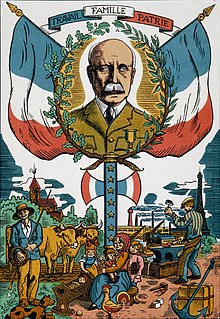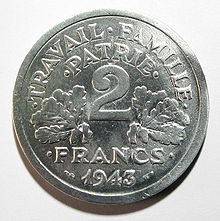勞動、家庭、祖國


「勞動、家庭、祖國」(法語:Travail, Famille, Patrie,法語發音:[tʁavaj famij patʁi])是法蘭西國(通稱維希法國)在二戰時期的國家格言,它取代了法蘭西第三共和國的國家格言:「自由、平等、博愛」[1]。
起源[編輯]
1940年7月10日菲利普·貝當在德國的支持下取得權力後的憲法草案中,提到要保證「勞動、家庭和祖國的權利」。該憲法從來沒有頒佈。
1940年9月15日《兩個世界》(Revue des deux Mondes)雜誌上,貝當對原是法蘭西共和國的國家格言「自由、平等、博愛」做出了以下評論:「當我們的年輕人[…]成年後,我們應該對他們說[…]若不在他們必須服從的權威的指導下,他們不能取得真正的自由[…]。我們應該告訴他們平等本身是在等級制度的框架下的[…]最後,我們應該告訴他們除了在自然形成的族群、家庭、城鎮、祖國間,不存在真正的博愛」[2]。
「勞動、家庭、祖國」原為「火十字團」的格言,隨後被法蘭西社會黨(Parti Social Français, PSF,注意不是法國社會黨)所用[3]。
這三個詞表達了維希政權「國家革命」(Révolution nationale)的理念。
參考文獻[編輯]
- ^ France has a written constitution so that each time political pressures are such as to require its radical rewriting, the new system is given a new name. The current constitution is that of the Fifth Republic but there have been two empires, a consulate and a state. In the same way, Germany had used the term Reich (State). Under the conditions of 1940, this appears to have influenced the choice of the equivalent French term, Etat. The then current Reich was the third one.
- ^ Maréchal Pétain, Politique sociale de l'avenir (Future Social Policy) , La Revue des Deux Mondes, 15 September 1940
- ^ Albert Kéchichian, Les Croix-de-feu à l'âge des fascismes – Travail, Famille, Patrie, Éditions Champ Vallon, 2006
外部連結[編輯]
- Study Centre Edmond Michelet, Vichy family policy on the centremichelet.org site (法文)
- Rennes Academy, Vichy Propaganda and Collaboration, on the ac-rennes.fr site (法文)
